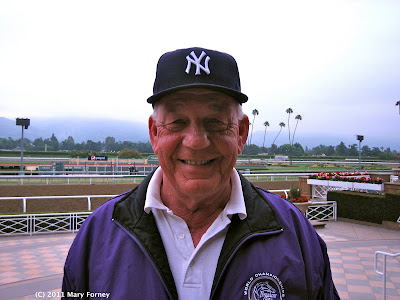
Trainer Jim Cassidy at Santa Anita Park
While the eyes of the horse racing world will be on New York Saturday for the 143rd running of the Belmont Stakes, New York transplant Jim Cassidy will be hoping to repeat in a stakes race on the West Coast, the Grade 2 Honeymoon Handicap at Hollywood Park.
Cassidy won the Honeymoon last year with Evening Jewel. This year he has a double shot - with Whisper Louise and Singapore Lilly - in the mile and one-eighth turf event for three-year-old fillies.

Singapore Lilly poses at Cassidy's barn.
A native of the Bronx, New York, Cassidy is easily spotted training at Santa Anita sporting a NY Yankees baseball cap. He began his training career in New York, where he worked for trainers Joe Cantey and Frank Whitely, who conditioned the brilliant filly Ruffian at the time. Cassidy relocated to Califoria in 1981. In recent years, he has established a reputation for purchasing horses in Europe and running them successfully in the United States. Some of his best runners have included Stepoutoftheboat, Royal Torrent, Wrekin Pilot, Inca Tern, Phone Alex, Singhalese, Moscow Burning, Ticker Tape, and Katdowgawn. His current roster of runners includes The Usual Q.T., Fifth Ave, Evening Jewel, Wave Of Applause, and Surrey Star.
In an interview Friday morning at Clockers' Corner, Santa Anita, Cassidy discussed his two fillies, both purchased from the Tattersalls Horses in Training Sale last November.

Whisper Louise shows off her heart-shaped blaze.
"Whisper Louise ran very well first time," he said. After being bumped at the start and having to be steadied early, Whisper Louise finished strongly to place second by three-quarters of a length to Cambina in the Grade 2 Providencia Stakes at Santa Anita in April.
"Singapore Lilly didn't run like we thought she would," Cassidy continued. "But I am looking for a big improvement. Her race might have been too close to shipping." His expectations for Singapore Lilly are understandable.
"Singapore Lilly is Group placed and had more credentials than the other filly," he said.
"Both fillies have been training forwardly," Cassidy added. "They do their jobs in the morning."
Cassidy trains Whisper Louise for Three Chimneys Racing LLC and Singapore Lilly for Jeffrey J. DeHaven.
The Honeymoon, a key prep for the $250,000 American Oaks on July 16, has drawn a field of nine, including Cambina and Star Billing. It is one of four stakes on Saturday's program at Hollywood Park.






